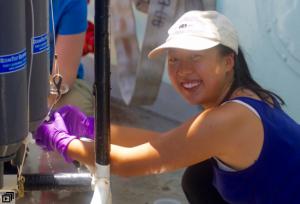Content:
As a professor of marine microbiology and geochemistry at UCSB, I teach students about the ocean; sometimes I even get to teach them about its chemistry and the microbes that drive that chemistry.
Normally this all occurs in the classroom, where PowerPoint slides must serve as seawater and my voice the endless howl of the wind that moves heat and water to structure the currents of the deep sea. But let’s face reality, a 75-minute lecture about deep ocean currents pales in comparison to experiencing those currents in person, while peering through the window of a submarine. As an oceanographer I have the opportunity to experience the ocean in this way and, beginning in 2004, I made a concerted effort to integrate my classroom teaching with my oceanographic research. With financial support and backing from the National Science Foundation, I developed a course sequence focused on oceanographic research questions in microbiology and chemistry, wherein two or more quarters of preparation culminate in a genuine oceanographic expedition, for which the students become active participants in cutting-edge oceanographic research.
- See more at: http://www.news.ucsb.edu/diary-research-cruise?utm_source=newsletter&utm...
As a professor of marine microbiology and geochemistry at UCSB, David Valentine teaches students about the ocean; sometimes he even gets to teach them about its chemistry and the microbes that drive that chemistry.
Normally this all occurs in the classroom, where PowerPoint slides must serve as seawater and his voice the endless howl of the wind that moves heat and water to structure the currents of the deep sea. But let’s face reality, a 75-minute lecture about deep ocean currents pales in comparison to experiencing those currents in person, while peering through the window of a submarine. As an oceanographer he has the opportunity to experience the ocean in this way and, beginning in 2004, he made a concerted effort to integrate his classroom teaching with his oceanographic research. With financial support and backing from the National Science Foundation, he developed a course sequence focused on oceanographic research questions in microbiology and chemistry, wherein two or more quarters of preparation culminate in a genuine oceanographic expedition, for which the students become active participants in cutting-edge oceanographic research.


